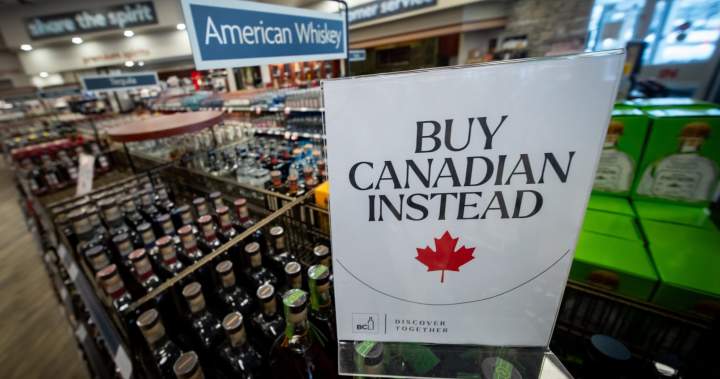Nearly six months after provinces and territories pulled U.S. alcohol products from liquor store shelves amid the ongoing Canada-U.S. trade war, many Canadians may be wondering: where do those products end up?
Quebec set off a firestorm last week after its liquor board said it might have to destroy $300,000 worth of American products in storage that were set to expire. The province’s finance minister later said the products would be donated instead.
The Distilled Spirits Council of the United States on Monday called for the return of American products to stores, after Prime Minister Mark Carney announced Friday that he was removing Canada’s counter-tariffs from U.S. goods covered by the Canada-United States-Mexico Agreement on free trade.
Global News reached out to every province and territory for details on the fate of U.S. alcohol products since they were removed from store shelves in early March.
Alberta and Saskatchewan both ended their moratoriums on U.S. liquor in June, but are still encouraging customers to buy Canadian products instead.
A spokesperson for Alberta Gaming, Liquor and Cannabis said no products held back from shipment or sale were destroyed due to expiry before the province began allowing the sale of existing stock again on March 18.
Ontario, Nova Scotia and Manitoba are keeping their American alcohol products in storage for now, their provincial liquor boards told Global News, with no plans for resale.
“U.S. product remains off LCBO shelves and are currently held in storage until further notice,” a spokesperson for the Liquor Control Board of Ontario said in an email. “We are reviewing the best course of action to address any future expiration concerns.”
The Nova Scotia Liquor Corporation is currently holding about $14 million worth of American products in storage and has “not disposed of any of these products,” a spokesperson said.
“For the time being, all U.S. product has been packaged and stored,” they said in a followup email, adding that decisions on future sale of those products will be made by the provincial government.
A spokesperson for the Manitoba Liquor & Lotteries Corporation said it does not have to manage any “significant” spoilage of U.S. products being held at its distribution centre, which are mostly wine and spirit products that have a long shelf life.

Get daily National news
Get the day’s top news, political, economic, and current affairs headlines, delivered to your inbox once a day.
“U.S. products continue to be held in storage,” the spokesperson said. “Because the situation with the U.S. continues to evolve, we cannot identify at this time what might happen to any American products.”
The Newfoundland Labrador Liquor Corporation “is continuing to hold the U.S. product in storage for the time being,” a spokesperson said, and “will continue to monitor the situation.”
A spokesperson for the Prince Edward Island Liquor Control Commission said American inventory is being held from stores and is being monitored “following appropriate procedures, including secure destruction when necessary.”
British Columbia, New Brunswick and Yukon’s liquor boards told Global News they are authorized to resell existing U.S.-made inventory to licensees until those supplies run out. After that, American products will be unavailable for purchase.
“This means privately-owned liquor stores, restaurants, bars and pubs continue to be able to order and sell U.S.-made liquor products (wines, spirits, beer and refreshment beverages) from existing inventory in LDB and third-party bonded warehouses already in the province, while it lasts,” a spokesperson for the B.C. Liquor Distribution Branch said.
The B.C. liquor board has not planned any returns of U.S. products to its vendors due to expiry, the spokesperson added.
The New Brunswick Liquor Corporation (ANBL) moved to a similar resale model in May, “with the tariff situation continuing to evolve and previously-purchased American stock occupying space in our warehouse that was needed for new inventory,” a spokesperson said.
“Once (licensees) sell through that inventory, they will be unable to get more,” the spokesperson said. “ANBL has not ordered any U.S. products since February, and will not until the tariff situation is resolved to New Brunswick’s satisfaction.”
Reselling existing inventory to licensees “will help us minimize waste and recover investments we have made in U.S. products,” the spokesperson added, noting requests for those products from customers have been “minimal.”
“We continue to work internally and with government on strategies to minimize any waste resulting from the removal of American products,” the statement said.
The Yukon Liquor Corporation is also authorized to resell its American inventory until it’s depleted, and therefore it does “not foresee the need to destroy any U.S.-made alcohol products” in the territory, a spokesperson said.
A spokesperson for Nunavut’s Finance Ministry said the territory began selling existing U.S.-made inventory again in July — both in territory-run liquor stores and to licensees — but its just-completed resupply orders for the coming year “have not included any U.S.-made product.”
Last week, Quebec’s liquor board, SAQ, said it was preparing to potentially destroy soon-to-expire alcohol products, including American rosé and boxed wines, ready-to-drink cocktails, and certain beers and liqueurs not suitable for prolonged storage.
However, liquor board spokesperson Laurianne Tardif said in a statement that the fate of those products had “not yet been finalized” and planning was ongoing.
SAQ said it had $27 million worth of American products in storage, of which $300,000 worth of stock was facing possible destruction.
The storage itself cost the corporation nearly $500,000 between March 4 and June 21, according to SAQ.
Finance Minister Éric Girard quickly intervened, announcing on X that SAQ would prioritize the soon-to-expire products for donation to foundations, charity events and training purposes in provincial hospitality schools.
SAQ has since invited interested organizations to contact it about receiving donated products.
— with files from The Canadian Press
Read the full article here

